Coffee and Anxiety: What You Need to Know
Amy Barczy
| 2 min read
Amy Barczy is a former brand journalist who authored content at Blue Cross Blue Shield of Michigan. Prior to her time at Blue Cross from 2019-2024, she was a statewide news reporter for MLive.com. She has a decade of storytelling experience in local news media markets including Lansing, Grand Rapids, Holland, Ann Arbor and Port Huron.

Everyone who’s had one too many cups of coffee in the morning knows the sensation: that brain-buzzing, eyes-wide-open, heart-pounding, jittery feeling. Being over-caffeinated can make your body feel off – but what is it doing to your anxiety? Caffeine can mimic symptoms of anxiety, which means coffee in the morning could hurt more than help if you drink too much. Caffeine is a psychostimulant that impacts the central nervous system. While there are helpful side effects to consuming caffeine, too much can result in:
- Anxiousness
- Fast heart rate
- Feelings of unhappiness
- Headache
- Insomnia
- Jitters
- Nausea
- Upset stomach
It’s important to note that feelings of anxiety and generalized anxiety disorder are different. While general anxiety occurs as your body reacts to everyday stress, generalized anxiety disorder is diagnosed by a professional when you have chronic anxiety without triggers and consistently feel worried or stressed.
So how much is too much caffeine? The U.S. Food and Drug Administration advises adults can consume 400 milligrams of caffeine a day without being too at risk for negative effects. That’s about four to five cups of coffee. But people metabolize caffeine at different rates, and some people are more sensitive to caffeine than others. Here’s how much caffeine is in some common beverages, according to the Mayo Clinic:
If you’re pregnant or trying to become pregnant or are breastfeeding, talk to your health care provider about how much caffeine is safe to consume. Certain medications or conditions may also be sensitive to caffeine intake, so it’s important to consult your health care provider. It typically takes four to six hours for the body to break down and process half of the caffeine you consume. Which is why consuming caffeine at lunch time or in the afternoon can affect your ability to fall asleep at night. If you are concerned about your feelings of anxiety, a health care professional may be able to provide some insight as to whether caffeine consumption could be a culprit. More from MIBluesPerspectives:
- Signs of Colon Cancer
- Relaxation Techniques for Computer Fatigued Eyes
- Why It’s Important & How to Take Care of Your Gut
Photo credit: Getty Images





